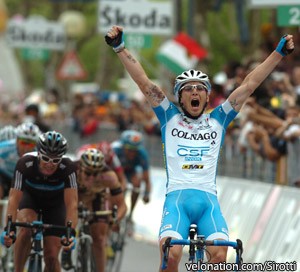Surprise wildcard lost team leader and sprinter but managed stage win.
 With an average age of 24.3 years, Colnago-CSF Navigare was by far the youngest team in this year’s Giro d’Italia. The team was awarded a wildcard over more successful Italian teams, De Rosa-Stac Plastic, Ceramica Flaminia-Bossini Docce and ISD-Neri, and the two Dutch teams Vacansoleil and Skil-Shimano.
With an average age of 24.3 years, Colnago-CSF Navigare was by far the youngest team in this year’s Giro d’Italia. The team was awarded a wildcard over more successful Italian teams, De Rosa-Stac Plastic, Ceramica Flaminia-Bossini Docce and ISD-Neri, and the two Dutch teams Vacansoleil and Skil-Shimano.
The first two of those Italian teams were paying for past sins, as De Rosa-Stac Plastic was the LPR Brakes team of last year, which boasted the now suspended Danilo Di Luca; Ceramiche Flaminia-Bossini Docce signed Riccardo Riccò this year and the Giro organisers are not quite ready to invite him back. ISD-Neri’s non-invitation at the expense of Colnago-CSF Inox was more of a surprise.
Colnago-CSF Inox has paid the penalty for past Giro crimes itself; rebuilt as it is from the CSF Group-Navigare team. Team leader Emanuele Sella tested positive for CERA at the 2008 Giro and the team was not invited back last year.
The team leader this time was 27-year-old Domenico Pozzovivo, who’d finished 9th in the 2008 race and was expected to do even better this time. Also expected to shine was sprinter Sacha Modolo; the 22-year-old has been mixing it with far more illustrious names his first pro year and finished 4th in the Milano-Sanremo back in March.
The race started badly for Pozzovivo though as he crashed in the stage 1 time trial in Amsterdam. Injuries to his left leg saw him favouring his right side and effectively ending his overall hopes.
The team was determined to start aggressively though, putting Stefano Pirazzi was in three-man kilometre zero attack on stage 2, the first road stage; he came close to getting his hands on the green mountains jersey. Once the race had returned to Italy Simone Stortoni was second behind Chris Anker Sörensen on stage 8 to Monte Terminillo.
The team’s real highlight came though when Manuel Belletti won stage 13 in Cesenatico, in his home region. One of the more conventional stages saw a breakaway of riders a long way down the overall classification allowed to stay away by the peloton. The 24-year-old kept his head in the birthplace of Marco Pantani and beat a number of more experienced riders.
It wasn’t all good news for the team on that stage though as Pozzovivo finally succumbed to his stage 1 crash and abandoned.
Most of the riders in the team named the rainy stage 11 to L’Aquila as the toughest of the whole race. For Simone Strotoni it was especially tough though, “I had a temperature of 38°C,” he explained. “I took two paracetamol in the race and Pelllegrini the mechanic had to force me to eat two sandwiches.”
Unsurprisingly, the riders’ favourite moment of the race was Belletti’s stage win. “Personally I didn’t have [a highlight],” said Modolo, “though it would have been nice to be there when Belletti won. Instead I was watching TV.” [The sprinter had abandoned on stage 8 – Ed]
“There have been many [great moments],” said Alan Marangoni. “I choose the “Processo alla Tappa” [TV show – Ed] after Belletti’s victory. Seeing him speak in a voice choked with emotion made me laugh.”
Marangoni’s gratitude after the race went: “To all the team and staff. We have a fantastic team and that we finished as five is due to the continuous encouragement that we have given each other in difficult times.”
How the Colnago-CSF Inox riders fared:
Domenico Pozzovivo – DNF stage 13
Manuel Belletti – DNF stage 15
Sacha Modolo – DNF stage 8
Alessandro Bisolti – 74th
Federico Canuti – DNF stage 17
Marco Frapporti – 138th
Alan Marangoni – 107th
Simone Stortoni – 73rd
Stefano Pirazzi – 120th